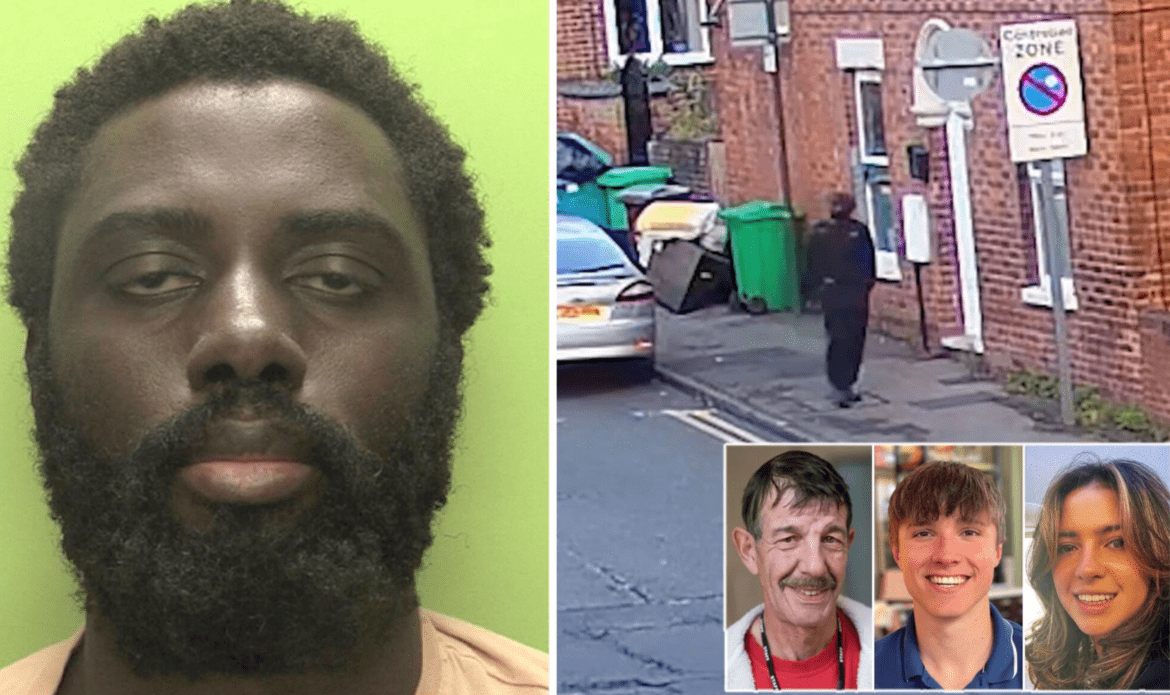‘NHS Trust Has Blood on Its Hands’: Report Reveals Trust ‘Minimized or Omitted’ Details of Risk Posed by Nottingham Killer
Valdo Calocane fatally stabbed students Barnaby Webber and Grace O’Malley-Kumar, as well as caretaker Ian Coates, in June 2023. A review has revealed that prior risk assessments downplayed the seriousness of his refusal to take medication and his ongoing, persistent symptoms of psychosis.
The services responsible for caring for Nottingham killer Valdo Calocane before his attacks have been accused of having “blood on their hands” after it was revealed that an NHS trust “minimized or omitted” crucial details about the severe risk he posed to others.
Calocane, who suffers from paranoid schizophrenia, fatally stabbed 19-year-old students Barnaby Webber and Grace O’Malley-Kumar, as well as 65-year-old caretaker Ian Coates, in June 2023.
In January, he was detained in a high-security hospital, “very probably for the rest of his life,” after prosecutors accepted his plea of manslaughter on the grounds of diminished responsibility.
The second part of a review by the Care Quality Commission (CQC) focused on how the Nottinghamshire Healthcare NHS Foundation Trust (NHFT) managed the care of 32-year-old Valdo Calocane before the killings.
The review found that between May 2020 and September 2022, the trust’s risk assessments downplayed the fact that Calocane was refusing to take his medication and experiencing ongoing, persistent symptoms of psychosis.
While some risks were noted, the regulator reported that other assessments “minimized or omitted key details.” Despite clear evidence that Calocane would likely “relapse into distressing symptoms and potentially aggressive behavior,” the trust decided to discharge him back to his GP in 2022.
The review also revealed that Calocane had been detained in a hospital four times under mental health laws before the attacks.
Grace O’Malley-Kumar’s parents, Dr. Sinead O’Malley and Dr. Sanjoy Kumar, told Sky News they were left “devastated” by the findings of the report.
Dr. Kumar went on to say, “This was a straightforward case—a clear instance of someone who was culpable and failed to take his medication.”
Dr. Kumar expressed, “Reading this is devastating. It was so basic.
“The mistakes weren’t technical—they were fundamental, basic errors. There were numerous opportunities to alter Calocane’s course, but none were taken by any of the doctors.
“The doctor who discharged him made the most irresponsible decision, knowing that… another doctor had noted he had the potential to murder someone.”
He continued, “Any psychiatrist who releases a dangerous person onto our streets must be held accountable for putting that patient out there.”
The CQC reported that Calocane’s care involved “a series of errors, omissions, and misjudgments.”
Chris Dzikiti, the watchdog’s interim chief inspector of healthcare, stated, “This review highlights points where poor decision-making, omissions, and errors in judgment contributed to a situation where a patient with very serious mental health issues did not receive the necessary support and follow-up.”
While Dzikiti acknowledged that it’s impossible to say whether the events of June last year could have been prevented if Calocane had received proper care, he emphasized that “the risk he posed to the public was not managed well, and opportunities to mitigate that risk were missed.”
“For those involved, their families, and loved ones, the damage cannot be undone,” Dzikiti added.
The CQC raised concerns about how effectively the trust engaged with Calocane’s family, who had repeatedly expressed worries about his mental state.
The victims’ families described the review’s findings as “devastating.”
In a joint statement, they said, “This report reveals gross, systemic failures by the mental health trust in their handling of Calocane from start to finish.
“We were let down by multiple organizations both before and after June 2023. Along with the Leicestershire and Nottinghamshire police forces, these departments and individual professionals have blood on their hands.
“Alarmingly, there seems to be little or no accountability among the senior management within the mental health trust. We question how and why these individuals remain in their positions.”
The families confirmed that a public inquiry will be conducted to investigate the events leading up to the attack, following their meeting with Health Secretary Wes Streeting and Attorney General Richard Hermer.
A special review of mental health services at NHFT was commissioned by then Health Secretary Victoria Atkins in January after Calocane’s conviction.
In the findings released on Tuesday, the CQC stated that during the time Calocane was under the trust’s care, it was “clear that he was acutely unwell.”
The report noted that he exhibited symptoms of psychosis, had little understanding or acceptance of his condition, and early concerns were raised about his issues with taking medication.
The CQC also found that if Calocane had been treated under section 3 of the Mental Health Act after his fourth hospital admission, healthcare professionals could have administered longer-lasting medication, even against his will, or considered placing him under a community treatment order, which allows treatment to be administered in the community rather than in a hospital.
However, Calocane was placed under section 2 of the act, typically used for individuals not previously known to mental health services.
Mr. Streeting described the report as “distressing reading, especially for those who are living with the consequences of their loss, knowing that these untimely deaths were avoidable.”
“I want to ensure that the failures identified in Nottinghamshire are not being repeated elsewhere,” he added.
An NHFT spokesperson stated, “We acknowledge and accept the findings of this report and have made significant improvements to our processes and standards since the review was conducted.”
The handling of the Calocane case sparked public outcry and led to several inquiries into the public bodies involved, including Nottinghamshire Police and Leicestershire Police.




